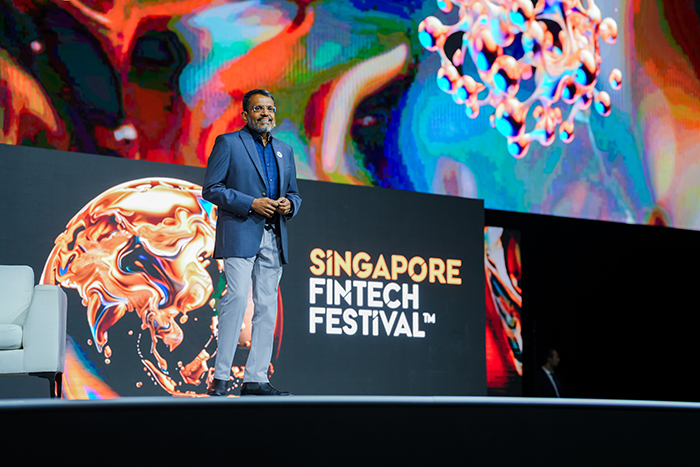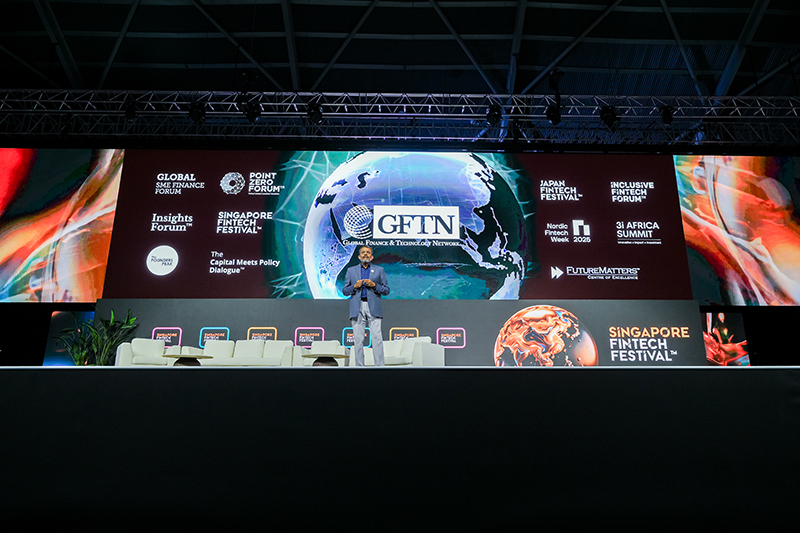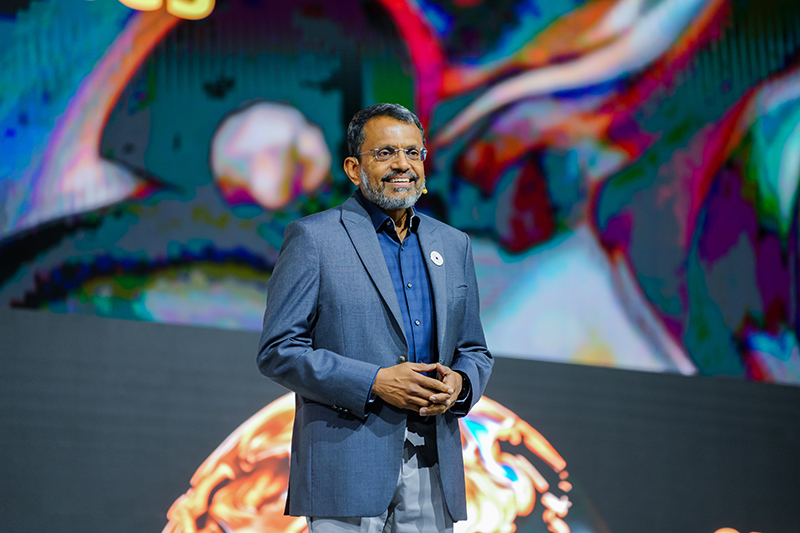Singapore FinTech Festival, 2024, Singapore Expo, 6 November 2024, Chairman of Global Finance & Technology Network, Mr. Revi Menon the keynote address;

Good morning, and welcome to the ninth edition of the Singapore FinTech Festival.
We call it the Singapore FinTech Festival, but the FinTech story is not just about Singapore.
- It is about how the global FinTech community – FinTech firms, financial institutions, and Big Tech – is coming together to advance innovation in financial services.
- It is about a global FinTech ecosystem taking shape – across borders and across the public and the private sectors – to expand economic opportunity and social good.
I am delighted therefore to share details of the Global Finance & Technology Network – or GFTN for short.
Launched by the Monetary Authority of Singapore last week, GFTN represents not just the next phase of Singapore’s FinTech journey but also a milestone in the global FinTech movement.

GFTN will replace Elevandi – the company limited by guarantee set up by MAS four years ago to organise the Singapore FinTech Festival.
GFTN’s mission is to harness technology and foster innovation through global partnerships to promote more efficient, resilient, and inclusive financial ecosystems.
- We will drive greater synergies within the global finance and technology communities for innovations in financial services that create positive economic value and social impact.
Why GFTN? Why this increased focus on global connections and collaboration? Three reasons.
One, we are seeing various new technologies where we need more coherent policies and practices to harness their benefits and manage their costs.
- Technologies such as asset tokenisation, climate tech, artificial intelligence and quantum computing, are progressing rapidly and proliferating in financial services.
- We need closer and more meaningful engagement between countries, between public and private sectors, and between finance and technology, to ensure that policies, regulations, and industry practices are coherent.
Two, to advance the innovation agenda amid the current geopolitical challenges, we need global platforms and safe spaces to promote collaboration and achieve common goals.
- As a non-state, not-for-profit organisation, GFTN aims to be such a platform, a trusted convenor.
Three, while there has been a burst of innovation in the Global South, there are critical gaps in talent, infrastructure, capital, and policy that we need to address in a concerted way.
- Innovation is emerging not only in Silicon Valley and London but also in cities like Nairobi, Jakarta, and São Paulo.
- Through its networks and partnerships, GFTN will aim to unlock sustainable and inclusive pathways to spread the benefits of FinTech more widely.

GFTN will have four strategic businesses:
- GFTN Forums – a global conference convenor, dedicated to finance and technology.
- GFTN Advisory – a knowledge centre, offering practitioner-led advisory services and research on innovation policies and ecosystems.
- GFTN Platforms – a platform service provider for businesses, especially small and medium enterprises and FinTech firms.
- GFTN Capital – an investment fund for technology start-ups that have the potential for sustained growth and positive social impact.
GFTN FORUMS
Let me elaborate on each of the four, starting with GFTN Forums.
Today, Elevandi works with public authorities in partner countries to organise FinTech events in five cities across three continents.
GFTN will develop a globally distributed, partnership-driven network of FinTech forums.
First, we will sharpen the focus of Elevandi’s five existing forums.
- The Japan FinTech Festival in Tokyo will focus on digital assets and provide a platform for collaboration between Japanese and Singapore financial institutions, investors and start-ups in areas such as InsurTech and ClimateTech.
- The Point Zero Forum in Zurich will focus on the nexus between regulation and technology, especially in areas like digital assets and artificial intelligence. The Point Zero Forum also has a strong research dimension, producing papers on cross-border payments and sustainable finance.
- The Inclusive FinTech Forum in Kigali and the 3i Africa Summit in Accra will focus on foundational digital infrastructure and financial inclusion. The two forums have spawned new FinTech initiatives strengthening connections between Africa and Asia, particularly Singapore.
- The Singapore FinTech Festival is where it all began and remains the largest and most impactful forum. It covers the intersection of policy, finance, and technology. A distinguishing feature is the large exhibition component that has helped to advance product and business development as well as market opportunities.
Second, we will expand into new geographies, to double our global footprint over the next five years.
- We will integrate the various forums into a single network, carrying conversations from one forum to the next, building momentum through the year and culminating at the Singapore Fintech Festival.
Third, we will launch a new dedicated forum on ClimateTech.
- Addressing climate change has become a priority in the financial sector, with growing interest in financing ClimateTech solutions for both carbon mitigation and climate resilience.
- GFTN will launch next year its first thematic forum – dedicated to fostering innovation and investment in ClimateTech and innovative sustainability solutions for the financial sector. Stay tuned for the details.
Fourth, GFTN’s forums will have a growing emphasis on artificial intelligence and quantum computing.
- AI is beginning to make significant inroads into financial services. We are seeing both AI-powered innovation and potential AI-driven risks.
- If quantum technologies take off, the coupling of AI and quantum computing could unlock huge opportunities as well as unprecedented security challenges.
Let me highlight just two aspects of AI among the many that GFTN forums will address:
- understanding the pros and cons of different AI models so that we can better harness the benefits of AI; and
- strengthening the governance frameworks around AI so that we can manage its potential risks and downsides.
AI encompasses a diverse range of technological models aimed at replicating human intelligence in various tasks. They are already having applications in financial services.
- Deep Learning Models or DLMs analyse multiple layers of complex data to train sophisticated artificial neural networks.
- Ant International uses DLMs to assess the creditworthiness of loan applicants by analysing thousands of data points from their online behaviour and digital footprint.
- Generative AI or Gen AI uses various AI technologies to create new content, including text, images, music, and more.
- Large Language Models or LLMs are a specific tool within Gen AI, processing massive amounts of text data to predict human language patterns and create content.
- JP Morgan’s LLM can review 12,000 commercial credit agreements in seconds, which previously consumed 360,000 hours of work each year.
Much of the recent focus has been on Gen AI and LLMs and they are being increasingly deployed in the financial industry.
- Take for instance fraud detection. Gen AI can track transactions based on location, device, and operating system, flagging any anomalies or behaviour that does not fit expected patterns.
- Another example: personalised financial advice. Gen AI can make customised budgeting, saving, and investing recommendations based on customers’ financial goals, risk profiles, income levels, and spending habits.
A trend that is worth watching is the emergence of Small Language Models or SLMs.
- SLMs offer a more efficient way for applications where LLMs may not be necessary.
- They are more purpose-driven, focusing on smaller, domain-specific datasets. This enables them to excel in particular areas.
- They have fewer parameters and take less time to train.
- SLMs potentially offer a way for an AI industry that is grappling with the huge energy demands from Gen AI and LLMs which obviously does not help the climate.
But to safely harness the potential of AI for the financial sector, we need to address its risks through strengthened governance in four areas.
- One, privacy of data. How do we harness the benefits of data aggregation and data sharing while safeguarding confidentiality of personal data?
- Two, explainability of results. How do we minimise the black box syndrome? The massive amount of data, complexity of the algorithms, and dynamic nature of AI systems make their results difficult to interpret and explain.
- Three, accountability for decisions. How can we hold humans ultimately responsible for decisions made by self-learning algorithms and machines? You cannot charge a machine for negligence in a court of law. You need to charge a person.
- Four, acceptability of outcomes. How do we minimise unconscious bias, social exclusion, and ethically unacceptable outcomes? AI models trained on incomplete or biased data can generate seemingly plausible but unsound predictions. These can in turn lead to flawed financial decisions regarding credit or investments.
Through its forums, GFTN looks forward to convening the key stakeholders in AI, promoting thoughtful deliberations, and facilitating responsible innovation and smart regulation.
Quantum technology is much more nascent. Some believe it will go nowhere, others that it will revolutionise financial services.
- Quantum computers that harness the laws of quantum mechanics have the potential to exponentially increase computing power compared to traditional computers.
- Financial institutions and Tech firms are using quantum technologies to solve complex problems like portfolio optimisation, risk modelling, and fraud detection.
But quantum computing also poses substantial – even existential – risks.
- Quantum technology can be used to compromise the encryption protocols that safeguard financial data, potentially undermining the fundamental pillars of finance – trust and stability.
- Couple of examples of these encryption-related risks posed by quantum computing:
- The compromise of inter-bank system interfaces could allow unauthorised access to sensitive financial data, including personally identifiable information.
- The compromise of public key cryptography which wholesale payment systems rely on for authentication could enable fraudulent payment transactions.
- Financial institutions are becoming increasingly cognisant of quantum computing risks, and are making efforts to migrate to quantum-resistant cryptography.
GFTN ADVISORY
Next, GFTN Advisory.
GFTN will provide practitioner-led consultancy and capacity-building services on innovation and FinTech related issues.
- We will provide authorities in developing countries advisory services to develop digital infrastructures, formulate policies to harness technology in financial services, and create robust innovation ecosystems.
- We will offer private entities market insights to support programmes which drive positive social impact through innovation.
- To do this work well, we welcome new partners to our advisory network.
An early area of focus for GFTN Advisory will be helping countries getting their foundational digital infrastructure right.
- We are entering an era of growing digital connectivity across borders, starting with electronic payments but moving to universal trusted credentials and data exchanges.
- To thrive in a digital economy, it is not enough to digitalise domestically but to digitally connect internationally.
I am pleased to announce we have already signed MOUs with two central banks on FinTech advisory services.
- The first is to support the efforts of the Bank of Namibia to build up its FinTech ecosystem and digital public infrastructure. GFTN’ will conduct a gap analysis, review regulatory and technical needs, and provide strategic recommendations.
- The second is to support plans by the National Bank of Georgia to grow the country’s FinTech industry.
GFTN is now working with partners in Rwanda and Ghana on a pilot project aimed at promoting cross-border payment connectivity in Africa.
- The project will explore the feasibility of achieving interoperability across the various e-payment schemes in Africa through appropriate infrastructure and policy frameworks.
GFTN PLATFORMS
Moving on to the third business line – GFTN Platforms.
GFTN will support a suite of digital platform services to help small enterprises and FinTech start-ups innovate and thrive.
- We will offer platform services to help enhance market access, provide analytics and information services, and support sustainability reporting.
GFTN will integrate into its network three platforms that were incubated in MAS and have been spun off.
- APIX provides a trusted digital platform for financial institutions and FinTech firms to collaborate, experiment, and deploy new solutions.
- Co-founded in 2018 by MAS, the ASEAN Bankers Association, and the International Finance Corporation, the APIX network now spans over 110 financial institutions and 2,000 FinTech firms from 90 countries.
- Proxtera provides a digital platform for micro, small and medium enterprises (MSMEs) to generate trusted digital credentials, and gain access to cross-border trade and financing.
- Launched by MAS and the Infocomm Media Development Authority in 2018, Proxtera has helped to bridge global trade for MSMEs – in Rwanda, Ghana, Chongqing, and most recently Cambodia, via the Financial Transparency Corridor.
- Gprnt is a digital platform for verifiable ESG data and reporting.
- Launched by MAS in 2023, Gprnt equips businesses with an automated ESG disclosure solution and sustainability-related value-added services.
I am pleased to announce that Gprnt released today its inaugural sustainability disclosure and marketplace offerings.
Gprnt Disclosure is an automated, Generative AI-powered tool to help businesses measure their Scope 1 and 2 emissions.
- Leveraging on integrations with data platforms like Singpass, Myinfo Business, Xero, and ESGpedia, Gprnt Disclosure will seamlessly compute basic emissions data for businesses in Singapore which allow Gprnt to access their data in these platforms.
Gprnt Marketplace offers a central portal to anchor the ecosystem of ESG solutions for businesses.
- It will help SMEs link to a range of sustainability solutions in the marketplace.
- Everything that Gprnt does will be guided by the principle of interoperability. Gprnt Marketplace will synchronise its listings with other key portals, such as the Singapore Business Federation’s Net Zero Hub.
The launch of these tools reaffirms Gprnt’s mission to deliver digital utilities that support Singapore’s baseline sustainability reporting needs.
- Gprnt will now focus on piloting the use of these tools with financial institutions, corporates, trade associations, and government agencies.
- Twenty public and private sector organisations in Singapore have already registered their interest.
- Please contact the Gprnt team if your organisation is keen to participate.
GFTN CAPITAL
Finally, GFTN Capital.
GFTN will catalyse equity investments into early-stage and growth-stage enterprises with the potential to succeed commercially as well as make a positive social impact.
- We will invest in FinTech and ClimateTech enterprises which have the potential for both strong growth and positive impact – such as strengthening financial inclusion or supporting environmental sustainability.
- We will provide these enterprises with patient capital, to give them the time and space to build up the capabilities to succeed
- We are already seeing promising investment ideas emanate from our existing GFTN ecosystem, which we aim to translate into high-quality deals for our fund investors.
- We will partner world-class venture funds and asset management firms to tap on their investment expertise and infrastructure.
The value proposition that GFTN brings to the investment business is our access to a global network and deep insights spanning policy, technology, and finance.
- We can give our investee companies exposure to our global forums in Asia, Europe, and Africa – for market insights, entry opportunities, and access to a wide network of potential buyers, suppliers, and strategic partners.
- The programmes in our global forums can help provide more targeted help to our investee companies.
- The Capital Meets Policy DialogueTM provides access to sector-specific guidance from policymakers and investors.
- The Founders PeakTM facilitates mentorship by our community of start-up entrepreneurs.
GFTN – THE PEOPLE
I have laid out GFTN’s four business lines and focused on a couple of key technologies. But it is the people in GFTN and the community that has built up around our global forums that will be key to our success.
I am pleased that the outstanding team at Elevandi will be moving over to GFTN. We will need to expand but we are starting with a strong base.
I am grateful that Mr Sopnendu Mohanty will join GFTN as Group CEO in February next year. Sopnendu has been instrumental in building the FinTech ecosystem in Singapore and forging international connections for a global FinTech ecosystem.
It is my privilege to chair the GFTN’s board of directors. I will be assisted by two highly experienced and respected individuals as Deputy Chairmen.
- Mr Leong Sing Chiong, Deputy Managing Director, MAS
- Mr Neil Parekh, Nominated Member of Parliament, Singapore, and Non-Executive Chairman at Tikehau Capital.
The other board members are proven leaders from diverse backgrounds.
- Mr Iqbal Jumabhoy, Chief Executive Officer, ProsperCap Corporation Limited
- Professor Lam Khin Yong, Vice President (Industry), Nanyang Technological University
- Mr Andrew Lim, Partner, Allen & Gledhill
- Ms Jessica Tan, Group Executive Vice President & President, Sunlife Canada
- Mr Sopnendu Mohanty, Group CEO-Designate, GFTN
The Board of Directors will be guided by an International Advisory Board, comprising distinguished leaders with a demonstrated commitment to the public interest.
- Mr Dominic Barton, Chairman, LeapFrog Investment; Chairman, Rio Tinto; and former Global Managing Partner, McKinsey & Company
- The Honourable Paula Ingabire, Minister of ICT and Innovation, Republic of Rwanda
- Mr Eric Jing, Chairman and Chief Executive Officer of Ant Group
- Dr Patrick Njoroge, former Governor of the Central Bank of Kenya • Dr Veerathai Santiprabhob, former Governor of the Bank of Thailand
- Dr Axel Weber, Advisor, Raisin; former Chairman of the Board of UBS Group; and former President of the Deutsche Bundesbank
We are also encouraged by the warm reception and strong support extended to GFTN by the United Nations Secretary-General’s Special Advocate for Financial Health, Her Majesty Queen Máxima of Netherlands, who is with us here today.
- Over the past 15 years, Queen Máxima has been an inspiring champion for harnessing digital technology to promote financial inclusion and enhance financial health, helping to expand access to credit, savings, insurance, and pensions for vulnerable populations around the world.
- Now as the UNSGSA for Financial Health, she will focus on the development of financial services that really contribute to financial health.
GFTN cannot do all that it wants to on its own.
- We will collaborate with like-minded partners and seek to maximise synergies across stakeholders in the global ecosystem.
- We will partner with multilateral bodies, public authorities, financial institutions, academics, and strategy consultancies to deliver our expanded suite of services.
- We will continue to work closely with MAS to enhance the connectivity of the Singapore FinTech ecosystem with both regional and global markets.
GFTN is here to serve a greater purpose, to harness the power of technology for
- a more efficient and resilient financial system;
- more inclusive financial services;
- expanded economic opportunities; and
- a sustainable planet
We invite you to join us in our journey.
Together, let us build a future where technology serves humanity, where innovation drives progress, and where finance is a force for good.




